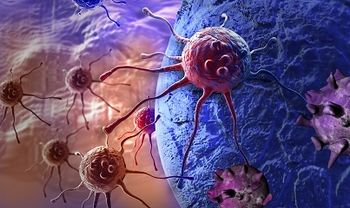
Depending on the amount consumed, intake of dairy milk can increase the risk of breast cancer by up to 80%, according to new research from Loma Linda University Health.

Depending on the amount consumed, intake of dairy milk can increase the risk of breast cancer by up to 80%, according to new research from Loma Linda University Health.

In the pivotal phase 3 KEYNOTE-355 study, pembrolizumab (Keytruda, Merck) combined with chemotherapy met one of its dual primary endpoints of progression-free survival (PFS) as a first-line treatment for patients with metastatic triple-negative breast cancer (TNBC) whose tumors expressed programmed death-ligand 1 (PD-L1).

The study was the first to examine proton pump inhibitors use in breast cancer survivors.

Dawn Hershman, MD, MS, offers some potential treatments for aromatase inhibitor-caused arthralgia in breast cancer patients. This video was filmed at the 2019 San Antonio Breast Cancer Symposium.

Because of the vulnerabilities of CDK4/6i-resistant tumors, researchers believe that it is imperative to improve the survival of this group of patients.

Rita Nanda, MD, discusses various immunotherapy drugs in the pipeline and which she thinks will be approved next. This video was filmed December 11 at the 2019 San Antonio Breast Cancer Symposium.

A study suggests that even brief art-making interventions can be beneficial for stressed caregivers of patients with cancer.

Rita Nanda, MD, explains how researchers are aiming to make immunologically silent tumors more inflamed. This video was filmed at the 2019 San Antonio Breast Cancer Symposium.

Although CDK4/6 inhibitors prolong progression-free survival for patients with estrogen receptor-positive breast cancer, the ideal treatment for each patient is currently unclear until adverse effects appear.

The research presented at the 2019 San Antonio Breast Cancer Symposium suggests that the different mechanisms could be exploited to overcome CDK4/6 inhibitor resistance in breast cancer patients.

Check the Pharmacy Times® website for more information and be sure to watch for daily newsletters, online conference articles and videos, and social media updates.

Men with breast cancer had higher mortality than women regardless of cancer type, treatment, and access to care.

Specialty Pharmacy Times will be on-site in San Antonio, TX, for the 2019 San Antonio Breast Cancer Symposium, taking place December 10 to 14, 2019.

Trastuzumab-dkst (Ogivri, Mylan, Biocon), a biosimilar to trastuzumab (Herceptin, Genentech Inc.), has been launched in the US, according to an announcement from Mylan N.V. and Biocon Ltd. It is the first biosimilar approved by the FDA and recommended by the FDA Oncologic Drugs Advisory Committee.

Weight loss surgery found to cut the overall risk of developing cancers linked to obesity by 20%.

This weekly video program provides our readers with an in-depth review of the latest news, product approvals, FDA rulings, and more. Our Week in Review is a can't miss for the busy pharmacy professional.

The black-white disparity in breast cancer mortality has remained stable since 2011 after widening over the past 3 decades.

Fulvestrant injection treats certain types of breast cancer in post-menopausal women who were not previously treated with endocrine therapy and as a combination for advanced or metastatic breast cancer.

Cyclin-Dependent Kinase 4/6 Inhibitors, Margetuximab, Trastuzumab Deruxtecan, and Tyrosine Kinase Inhibitors Have Shown Promising Results

Older women with breast cancer who have a concurrent mental health condition are more likely to use opioids and have worse survival outcomes.

The newly approved therapy is equivalent to AstraZeneca Pharmaceuticals’ Faslodex injection, 250mg/5mL.

Researchers achieve first success in linking a solid tumor with blood biomarkers, which is often an indicator of whether a patient with breast cancer will remain in remission.

In addition to a natural variation in genetic makeup, approximately 1 in 1000 people inherit a damaged or mutated copy of the BRCA1 gene from a parent.

Study finds elevated risk factors for cardiovascular disease in postmenopausal women with a history of breast cancer.

Study findings suggest that triple-negative breast cancer incidence among black women is not generalizable to all women of African descent.